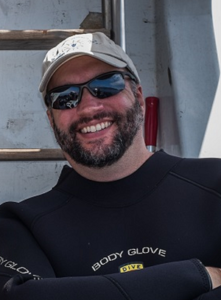by Cary Christopher and Lisanne Harrington
Temptation. It’s one of a writer’s greatest challenges when it comes to focusing on what’s important. You’ve got a great idea for a brand new monster (or hero, if you’re so inclined). You’ve researched it, outlined it, drawn up a character study and put down the first 10,000 or 15,000 words on the story, and then out of the blue, lightning strikes. BAZINGA! You’ve got another great idea. This one is even better than the one you were working on. This one could be the best one you’ve ever had!
So what do you do?
Well, duh! You stop writing on your first idea and you jump on the second. You research it, outline it, and put down 10,000 – 15,000 words. It’s fantastic! You pause to go grab a bite to eat and just as you sink your teeth into that delicious grub, lightning strikes again!
“How could one person be this creative?” you ask yourself.
You drop your fork and immediately start working on the new idea.
If this sounds eerily familiar to you, then you could be Cary Christopher, but probably not because Cary Christopher wrote this paragraph and this is not Invasion of the Body Snatchers. Then again, can you be sure about that?
A Cycle of Unfinished Projects
For Cary, the habit of giving into temptation was so bad, he repeated that cycle of new shiny ideas for a decade before he finished his first novel, The Wash. In that time, he published a number of articles and short fiction, but every time he got an idea for something longer, he would sketch it out to a certain point and then put it aside when the next new and exciting thing came along.
For Lisanne, temptation is procrastination’s evil twin. She gets tempted by the TV, social media, computer solitaire (just till I win a hand. Or three…), food (especially French fries, hot and crispy. Nom nom nom!), and her rowdy Miniature Pinscher Fiona, who is always quite vocal about playtime.
For you, it may be something completely different. It could be the temptation to go to the beach, hang out with friends, go to the movies or any of a million different options that don’t involve sitting in front of your computer and creating. It doesn’t matter where the temptation comes from; the ability to resist it is what we as writers need to develop.
So how do you do that? How do you resist temptation and stay focused on completing the big task at hand?
Focus, Damn It!
Let’s face it, how many times have you sat down in front of your computer and said, “I’m going to write today from 10:00 until 5:00,” only to find yourself answering Facebook messages and reading your favorite websites for at least part of that time? The fact is that maintaining laser focus is a very hard thing to do. Most creative people can only keep up true 100% creative focus for around 3 – 5 hours per day. Outside of that, work will still get done but distraction and temptation will begin to creep in. Many creative people take naps in order to recharge—Stephen King takes them nearly every day and look how creative he is!—but take it from Lisanne, it’s a battle she almost always loses because grogginess prevents creativity, and she always wakes up groggy.
Instead of avoiding temptation completely, look inward and figure out the time of day you are typically at your creative best. Some people are morning people. Some are late evening folks. For Cary, typically his most creative period is the first four hours after he wakes up. After that, it’s anyone’s guess as to what will get done. He tends to write on his deadline projects first and once he feels the creativity starting to wane, then he moves on to the things that tempt him or interest him the most. For Lisanne, she works best for a couple of hours immediately after morning coffee, and then again from late afternoon to early evening. Anything beyond that is pointless.
Give in to Temptation? The Horror!
For Cary, giving into temptation in small doses actually helps his creativity, and studies show it can help you too. When it comes to completing large projects, research points to “variety” as being a big booster to creativity and productivity. Lisanne has found that this is true for certain types of temptation. Some of her best ideas come while walking the dog, taking a shower, or folding laundry.
You just have to find what works for you.
Give Up the Slog and Take Up the Sprint
When working on a novel, it’s easy to feel that you’re making no progress at all because the end is so far away. Your sense of accomplishment is diminished because you’re taking such little bites out of the overall corpse (so to speak). When that feeling starts to creep in “Temptation” (with a capital “T”) follows right behind it.
The trick is to recognize it for what it is, acknowledge and embrace it, but keep it in perspective. Don’t let temptation derail you completely, but pulling off the track for a moment isn’t always a bad thing.
Studies have shown that the mind tends to work subconsciously to sort out problems and issues with one project while consciously working on another. In other words, you’ll likely be more motivated and more creative if you focus on meeting your deadline in shorter, intense bursts of writing than trying to knock things out in marathon sessions.
The key, though, is to make those shorter sessions part of your daily routine. You have to continue to write regularly in order to see the best results. Putting your writing off to every other day or some similar schedule tends to increase the amount of time it takes for your brain to get back into the focused, intense, creative mode.
Complete the Small Things
So for the time you’re not working on the bigger project, focus on following up on your temptations, or better yet try to tackle something smaller that you can actually complete. Being able to accomplish smaller tasks helps you feel like you’re making progress overall and can offset that hopeless feeling when you’re writing chapter ten of thirty on your larger piece. The more of a sense of accomplishment that you feel, the less likely your urge to follow a frivolous idea.
Unless, of course, that urge is to devour a huge plate of hot, salty fries…
How do you avoid temptation? Leave us a comment and let us know what works for you.
***
Cary Christopher was born and raised in Florida and Georgia but has called Southern California home now for almost 20 years. He’s written extensively about music, movies and pop culture online and for various publications around SoCal. Now he primarily writes for his blog (www.carychristopher.com). His new novel The Wash is available on Amazon.
Link to my Amazon Authors Page: https://www.amazon.com/Cary-Christopher/e/B076FD8MJ3
 After sixteen years as a paralegal, I staged a coup and left the straight-laced corporate world behind forever. I now pander to my muse, a sarcastic little so-and-so who delights in getting the voices in my head to either all speak at once in a cacophony of noise or to remain completely silent. Only copious amounts of Diet Cherry Dr. Peppers and hamburgers will ensure their complicity in filling my head with stories of serial killers, werewolves, and the things that live under your bed.
After sixteen years as a paralegal, I staged a coup and left the straight-laced corporate world behind forever. I now pander to my muse, a sarcastic little so-and-so who delights in getting the voices in my head to either all speak at once in a cacophony of noise or to remain completely silent. Only copious amounts of Diet Cherry Dr. Peppers and hamburgers will ensure their complicity in filling my head with stories of serial killers, werewolves, and the things that live under your bed.
I live in SoCal, in the small town I fashioned Moonspell’s Wolf Creek after, with my beloved husband and persistently rowdy, always-has-to-have-the-last-word Miniature Pinscher, Fiona.






Accountability and working smart are my saving graces. Accountability: I meet once per month, and have done this for close to twenty years, with a writing friend to assess our previous month’s production and the next month’s goals. So I always know that I’ll have to account for what did and didn’t get finished. Working smart: I have a work process that has a start gun and a finish line, and everything I need to get there. Especially a deadline. Each task in the process has ratcheted till optimal. My office mate once said to me, “How are you ranked number one in productivity? I’ve never seen you work.” Working smart, dude. Working smart.
I love that idea of meeting with someone you need to be accountable to. I’ve used Fictionaires for that before also. When I know that I’ve got to read, typically I use that as a deadline to finish something I’ve been dragging my feet on. Even if I end up not reading that piece, I like to have it in hand by the date of the meeting. I may look for someone to meet with once a month though. That really would keep the pressure on where I need it.
I love the idea of meeting for accountability. Like you, Cary, when I read at Fictionaires, I know I have a deadline, which I always work better to meet than without one. My publisher doesn’t give deadlines, so I find I have to create them myself, and then stick to them. Not always an easy thing, but then who ever said writing was easy? 😀
Great piece, Lisanne & Cary. I can relate to so much – I’ll focus on the bit that says “focus – damn it!” Good luck with your books x
Good luck to you, too, Mollie! And thanks for reading!
Thanks, Mollie!
Good article—so true of me! I’m a morning person and write on my primary book from 9 to Noon, take a long break, and either start again in the afternoon on the primary or work on something else. Focus, focus!
If I’m feeling particularly distracted I use the tomato method (Pomodoro). Twenty-five minutes of writing, followed by five minutes of some mindless chore. Rinse. Repeat. I’ve gotten my entire word count done and my house cleaned all in one productive afternoon.
So true for all of us! Life is so busy and distracting with so many alluring television binge shows so readily available. Social media and my inbox is my evil distraction. And now that I have read this, it’s back to work. Research time for 1911????
Ooh, ooh! Research! So easy to get lost in it. Good luck, and STAY FOCUSED! 😀
I just outlined a 50-chapter novel and then dropped it, on a whim, for something else. I’m doing EXACTLY what you said not to. It’s not that your advice isn’t excellent, well-thought-out, and persuasively expressed. I admire your ability to give cogent guidance, sharing the benefits of your own experience and hard-earned wisdom.
But my new idea is REALLY BITCHIN’!!!
Knowing you, Terry, I’m sure it is.
Now, FOCUS!